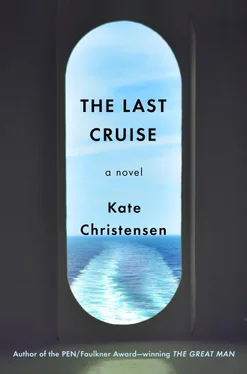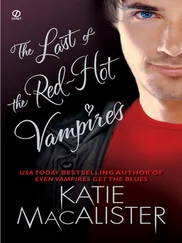Valerie leaned into her. “Who would I write to? You’re already here.”
Christine silently accepted this as a sort of apology, whether or not it was intended as such, even though Valerie didn’t really owe her one.
“Okay, except my editor,” Valerie was saying, typing quickly with both thumbs. “She won’t believe what’s going on, it’s such a good story.” She stopped typing and stared at her screen for a moment. “Good, it sent. And I can’t even with all these three hundred other messages, I’m just going to let them wait.”
Valerie turned off her phone and put it back into the pocket of her hoodie. Down below, an officer tossed a rope to the man on the Solar Wind and it drifted away, bucking and pitching slightly on the waves. The kids on board waved. Everyone waved back at them. The people around Christine seemed to deflate as the Internet connection vanished. But they all stayed crowded together by the railing, watching the boat disappear, first into the fog and spray, where they could still catch occasional glimpses of the tall fin of a solar sail, flashes of white bobbing off in the distance, and then over the horizon, where the sky was lighter, where the storm hadn’t reached yet.
*
After Kimmi went down to greet the catamaran, Miriam went back to the owner’s suite to check on her friends. Jakov was still asleep, and Isaac’s bed was empty. Both bedroom doors were closed. The instrument cases were cluttered in a corner of the room, the Six-Day War sheet music still on the music stands.
On her way out to the balcony, she paused to look at Jakov. He lay on his back, his face in profile pale in the stormy daylight, but he was sleeping peacefully for the first time in days. Maybe playing music all night, laughing, singing, had helped after all. His eyes were still, no fluttering. His big stomach hardly moved with his breaths.
She realized that he was dead.
“Jakov,” she said, hoping she was wrong, not daring to touch him. “Jakov, wake up.”
He didn’t move.
“Jakov!” She said sharply, loudly this time. “Time to wake up!”
His arms lay very still along his sides.
Miriam was breathing fast, gasping now. She went into her and Sasha’s room. “Jakov is dead,” she said wildly. “I can’t find Isaac.”
“He’s in with Rivka,” mumbled Sasha, half asleep still.
“In with who?”
“Oh my God,” said Sasha, waking up. He jumped out of bed and put on a robe and went into the living room. Kneeling by the daybed, he laid his open palm on Jakov’s forehead, his neck, his wrist. He slapped Jakov’s cheeks gently, lifted an eyelid and peered at his glassy, unseeing eye. Miriam felt like a coward for not touching him herself, like a terrible friend.
“Jakov,” said Sasha tenderly, drawing out the name. “He went in his sleep, without pain. He went in peace.”
Sasha started to cry, making small grunting sounds deep in his throat. He put his arms around Jakov and lifted him to hug his shoulders. Miriam stood stone-faced, staring at Rivka’s door, willing Isaac to come out. She didn’t want to knock, didn’t want to know what he was doing in there, what they were doing.
“Isaac,” she called finally in a loud, sharp voice. “Isaac! Come out, Jakov is dead.”
The door opened, and Isaac and Rivka came into the living room in their pajamas.
“Achi!” Isaac shouted. He went over to stand with his hand on Sasha’s shoulder, leaning on him for support, offering comfort at the same time.
Rivka went to Miriam and, without saying a word to her, put a hesitant, tentative hand on her back. Miriam felt herself stiffen and start to pull away, shocked, despite herself, that Rivka had spent the night with Isaac.
Oh, what did it matter? Jakov was dead.
She put her arm around Rivka’s shoulders and pulled her into the circle, and for a long time, the four of them stood in silence around their friend. Then Rivka broke away, went into her room and got dressed, and went down to the infirmary to tell them.
“Our dear Jakov is dead,” said Miriam when she’d gone. “After everything else. After all this.”
“It is more than my heart can bear,” Isaac said. “Truly, it’s too much.” He clutched his heart and looked at Miriam. “I feel it breaking. My brother is dead.”
“He was my brother too,” said Sasha. “And Miriam’s. He was family to us all. I never thought he’d be the one to go first.”
“Who then?” said Isaac suspiciously. “Me?”
Miriam looked tenderly at the two men she loved most, assessing their health, their spirits, as she had done for so many decades, out of habit, without premeditation or consciousness of doing so. Isaac looked flushed, his hair in more disarray than usual.
“Isaac, were you schtupping Rivka all these years? How could you not tell me? Please don’t waffle, just get to the point.”
“Nothing happened between us until now,” said Isaac. “She was married to our boss. And I had to protect the Sabra. That was all. That was my first and only thought. But Miriam, you always mattered the most to me. So me and Rivka, so what? You and I are each other’s family.”
Miriam was shocked to find a little tear coming into her eye. “Oh Isaac,” she said. She felt so close to him in that moment.
He patted her shoulder and stroked her wet cheek. “But you and Sasha! I never saw that coming, I was shocked, I really was. I was caught off guard. I’m still a little unnerved. I feel a hole in my heart about it.”
Sasha was gazing at Jakov. “It’s over now,” he said with deep sadness. “The quartet. Our brother is dead. It’s come to an end.”
The rain started in the middle of the afternoon. The sea surface churned with crisscrossing waves of a lucid, eerie green, whitecaps blowing off in foamy chunks. By evening, it was hard to tell the sea from the sky. It was all water and motion and wind, the waves coming from all directions, colliding.
It took well into the night for the storm to reach its full intensity. At least Christine hoped this was its full intensity. She and Valerie were sitting on Valerie’s bed, in their cabin, huddled together, staring at each other through the darkness, fully dressed and wearing life jackets.
The ocean moved itself around them, the ship’s long body climbing nose first up a mounting wave, then a moment of suspension when it hung on the peak, cresting, and then a lurching drop and a sideways slam against the pavement of the wave’s trough.
“Holy shit,” said Valerie. “What was that?”
A gust of wind and spray rattled the balcony door. Then came a vertiginous slow spin as the ship swung around and was hit broadside and tipped, heeling starboard, then just as slowly righted herself, then tipped to port. Christine felt her whole body clench in the slow climb up another wave, the brief suspension at the quivering crest, the fall onto the hard sea surface. Then came another roll into the trough and the slow, steady, determined bounce of the old ship, righting herself again, letting out cries deep in her frame that sounded like the full expression of her anger at having to take any more battering shocks to her old system.
Valerie crawled into the little bathroom to dry-heave over and over into the shower while Christine braced herself in bed with her feet against the outer wall, staring through darkness at the black sliding door, her eyes straining, imagining she saw seaweed, flecks, small iridescent fish, bits of driftwood blown against the glass. A few times, she fell into an exhausted stupor that started to turn into sleep, but then another wave came, and she jolted awake again and remembered where she was and what was happening. Any one of the oncoming waves might be powerful and steep enough to swamp the Isabella, plow her under with water, keep piling it on, weigh her down until she couldn’t come back up, bury her and send her spiraling slowly down to the bottom of the ocean. And after every wave came another wave. The Isabella staggered, recovered her balance, suffered another insulting sideways blow, pitched to starboard until it felt as if she’d never make it upright again.
Читать дальше












